“Hope is a Dragon” — Led By Donkeys at Stroud Book Festival
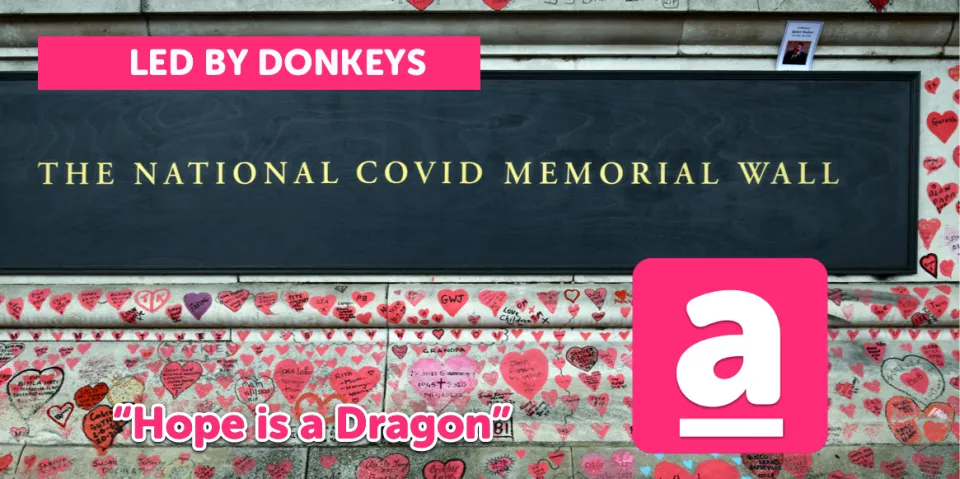
Led By Donkeys is a group of four people whose mission is to hold our political leaders to account. In their previous lives, they were direct action activists working for Greenpeace and other charities. On 10th November 2024, local artist and illustrator Joe Magee sat down with Ben and James with a filled-out crowd at the Subscription Rooms to discuss how to speak truth to power, and the importance of direct action in turbulent times.
Formed in 2019 as a reaction to the disarray around Brexit and perceived lies and failures in the run-up to the Referendum, Led By Donkeys began with guerilla-style posting up of billboards, reminding politicians of their own words. Their work developed to include films, unauthorised public art, and other interventions.
James Sadri: No, no there's nothing positive to say about Donald Trump. The only thing positive is that he is constitutionally barred from standing again. That's the only hope.
Ben Stuart: Every morning we get on Zoom and just sort of stare at each other and rant about what we’re incredibly frustrated about and from there comes an energy to do something about it.
Of course for the last six years there has been so much to be frustrated about and angry about and this is how the project started.
It wasn’t on zoom — actually we were in a pub and we were staring at a tweet - David Cameron’s infamous tweet “Britain has a decision: strong and stable government with me or chaos with Ed Miliband” - and staring at that we thought that would be awful if it was deleted and what could we do to stop it disappearing forever.
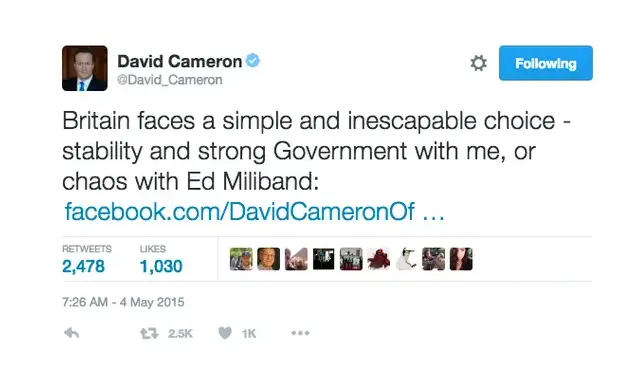
We looked out of the pub window and there was a huge six metre by three billboard sign. We thought “that’s sort of tweet-shaped, we could put it up there”.
James Sadri: And Ben always wanted to get into billboard posting so this was now the chance to do it.
For most things, you can go on Google or go on YouTube and look up how-to videos. But it turns out that there are absolutely no guides on line to how to put up a guerilla billboard poster!
Ben and Ollie went out for the first attempt…
Ben Stuart: …it was an absolute mess - we were trying to get this thing up and it was like a huge jigsaw puzzle. Twelve huge sheets and we had this wallpaper paste but it was the wrong consistency. Ollie was up a ladder. If you remember the tweet, it was like a huge picture of David Cameron’s face and his face peeled off the billboard and ended up wrapped around Ollie’s head while all these cars were going past, wondering what’s going on.
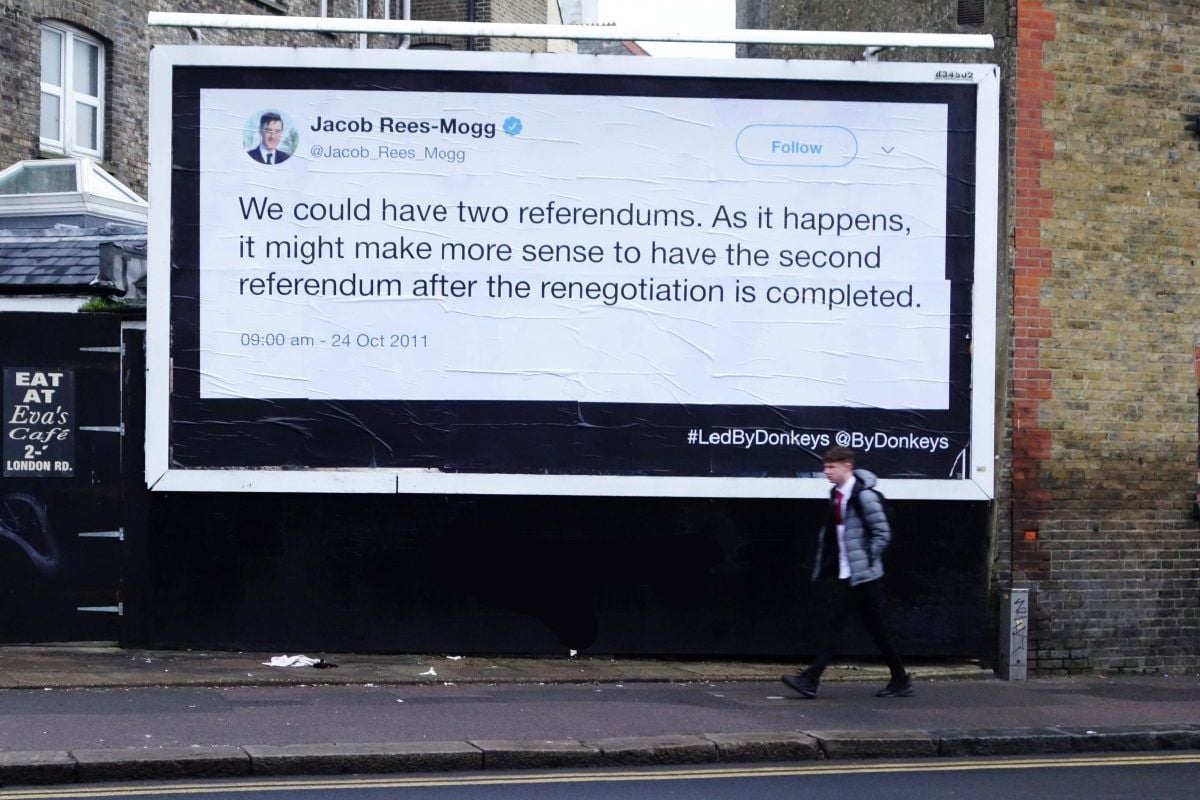
Eventually we got it up. And people were tooting and laughing as they drove past. We thought “We’ve got something here - it’s quite an arresting design” and that’s how it started.
We get together and we get very frustrated about something and then we find an idea that makes us laugh.
This is the gift of having worked at Greenpeace - you realise that if you really want to make something happen, you kind of can.
James Sadri: Not really — we have different backgrounds that we come to this with… I suppose we have slightly different skillsets but we all do everything together and that’s one of the strengths of the project, I think.
Ben Stuart: I mean, Will’s very visual - he’s a photographer - so he edited the film we played in the introduction but generally it’s all-in. We have a script and we all work on it together, we have the film edit and we all work on it together, we’re trying to paint the road outside the Russian embassy, we all go down there and do it together. It’s a sort of organic process - we don’t say “hang on a second, man, I thought you were vice-president for like paint affairs, get back in your lane!”
James Sadri: Actually we argue very infrequently. What we do have is a collective sense of what is a compelling idea and what would make a good intervention. Often this starts with a really bad idea and we bat it around for a long time, sometimes months and then it would transition from something that started as a nugget of a bad idea into something that we all look at and go “that sounds brilliant”
The Tyranny of the Idea
We have this concept of “the tyranny of the idea” because it’s something that is so good that we have to go and do it.
Ben Stuart: The Tyranny of the Idea is completely overwhelming. For example, we had this idea that we wanted to visualise what it felt like for the 140,000 people that died during COVID and we had this idea that we would pile up 140,000 pebbles and we thought that was really small.
We were speaking to a group of families who had lost people in the Pandemic and eventually between the four of us we came up with this idea of having hand-painted hearts on the wall opposite Parliament.
Once you’ve decided that would work then it becomes really oppressive because you know you just have to do it. And it’s really difficult to do something like that.
At that point it’s just “all in” and we have to make it happen. It took about three months between coming up with that idea and the first day of trying to deliver it.
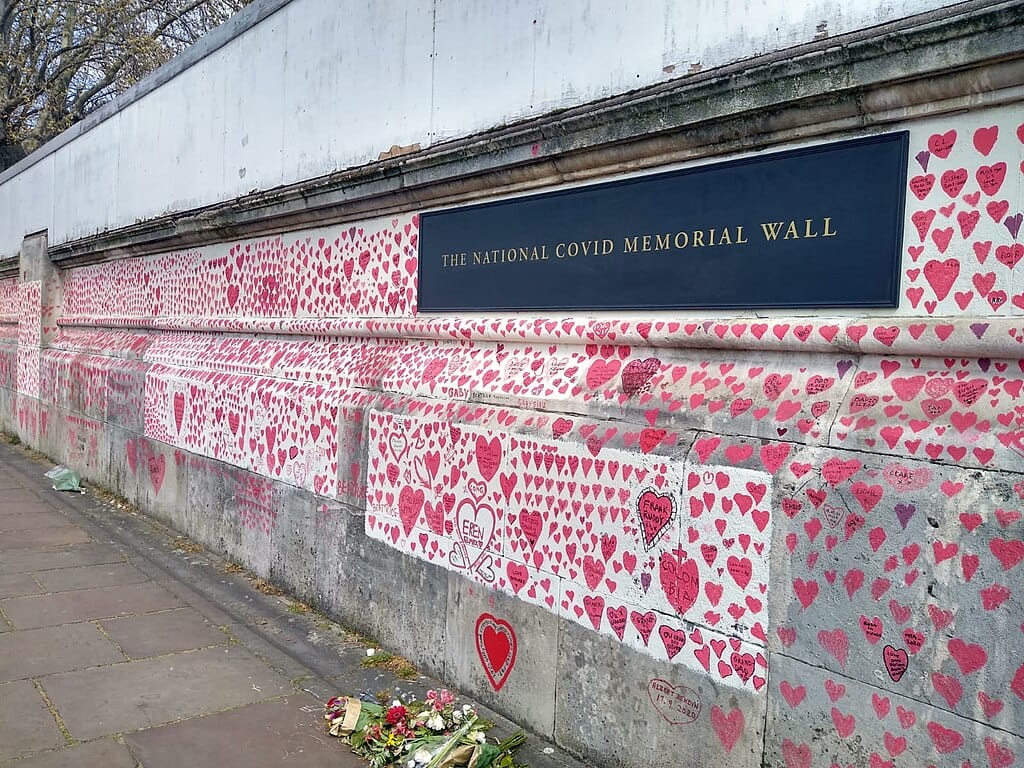
James Sadri: Lots of people ask that and we’ve intentionally. We’ve come from different organisations, NGOs that have a specific mandate or issues that they are campaigning on.
We felt the power of the project was it was in large part just an expression of how we felt about the world and all the interconnected ways in which all the issues interplay.
It’s not like we only care about issue X or Y.
Ben Stuart: If Ollie was here - whenever Ollie gets in front of a crowd he wants to sieze your attention and take the chance to tell you how important it is to have a written constitution. That’s his passion about UK democracy and it doesn’t mean that we don’t care about that.
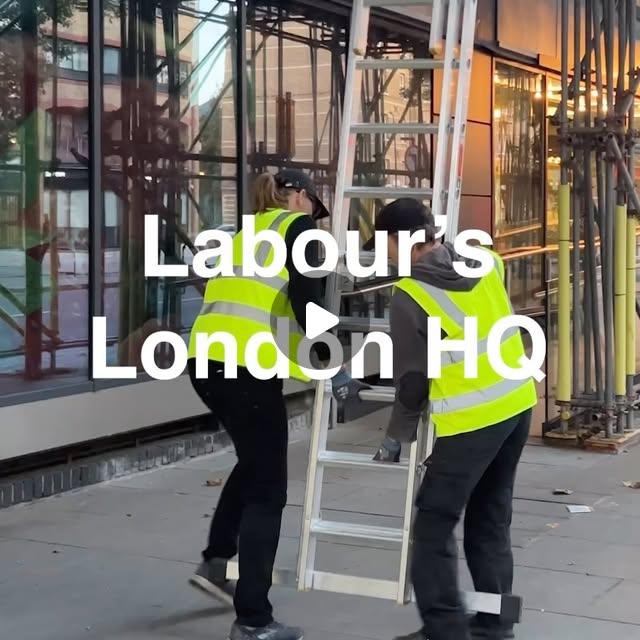
James is very very involved and exercised about Gaza - we all are in our own way. So we all bring something to it. Its agreeing on how to deliver some idea that would actually make progress happen that’s where we but up against each other a bit.
Ollie would always say that ideas get “rounded up” between the four of us. When we’ve worked at big NGOs, ideas can tend to get “rounded down” - someone will say “we can’t do it because of this, we can’t do it because of that.”
James Sadri: A good example of that is Michelle Mone’s yacht. The story of Michelle Mone - I’m sure you all know it - she’s the Tory baroness who managed to get her hands on 200 million pounds of Pandemic money - which was obviously all of our money which was meant to be spent on PPE for the people on the frontlines in the NHS.
Obviously the PPE ended up being unusable but she used her nepotistic connections, if you like, with the Tory party to land all this money that then she siphons through a tax haven through the Isle of Man with the help of her partner Douglas Barrowman and some of that ends up in a £15 millon pound yacht, called “the Lady M” which we kind of felt belonged to the British public - it was ours to do something with!

It started with this idea of "could we do something with the Lady M?" and obviously we needed to find out where it was for starters. The good thing about working at Greenpeace is that we had all sorts of friends who had very specialised skills and there was a particular mischief maker whose role was to track down —
Ben Stuart — he usually tracks oil tankers but we asked him to track this and he found it for us in a marina in South Barcelona. The original idea was actually to steal it and we would go down there and we would don captain's hats and we would sail it out of Barcelona Marina and we would sail it up the Bay of Biscay and up the Thames Estuary and we would park it on the Thames outside HMRC - the Treasury - take the keys and drop off at the desk, and say "it's our yacht - sell it - schools and hospitals please!"
James Sadri: it was a fantastic plan! Having talked about the Tyranny of the Idea we made an exception for that one after having the legal advice come back.
Ben Stuart: The legal advice said that we would be charged and convicted of piracy and that we wouldn't see our children for ten years, so we decided not to do that and instead decided to rename it to "the Pandemic Profiteer".
James Sadri: That in itself was a logistical undertaking because it wasn't just in any old marina, it was in a high-security private marina, off another marina so actually Ben, Ollie and Veronica - one of our action co-ordinators - chartered a nearby tiny little boat.
Ben Stuart: It was an electric launch. A tiny little boat that had a maximum speed of five knots.
James Sadri: So we arrived in this place and came up with this ruse that — it was February — completely off tourist season — we turned up with these picnic hamper things and said we'd really like to rent a boat to go off and have a picnic.
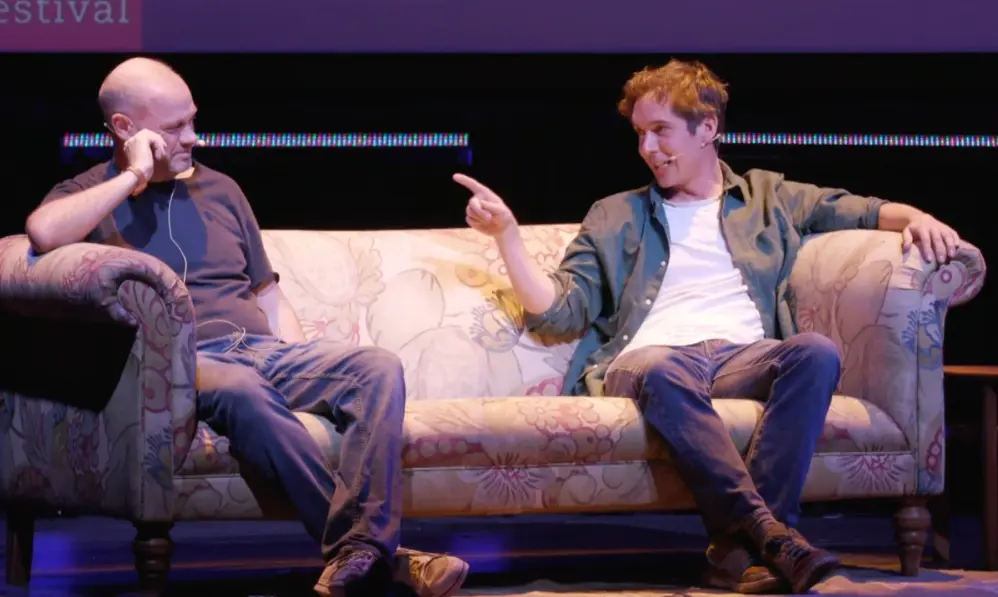
So you headed out in this little boat and I headed off with the photographer to this little cafe where I could get eyes on the boat and tell you when security wasn't around - so you could speed in and try and get this decal on the side of the boat.
We're in there waiting, waiting and then finally it was clear. We called through to the guys: "Go, go, go, go, go!" and we could see this tiny little boat - a pedalo would have done better - but you did it.
Ben Stuart: the security launch came out to intercept us in this moderately faster electric launch and we had this ridiculous walking-speed race to the jetty and the guy who we'd hired from asked if everything was okay. We chucked our picnic hampers to him, chucked him the keys, said "it was great! We had a brilliant picnic" and then just ran off while the security guard was coming after us.
The good thing was that got in the Daily Mail, the Daily Express - all the right wing papers and for us, that was our way of telling the Michelle Mone storey.
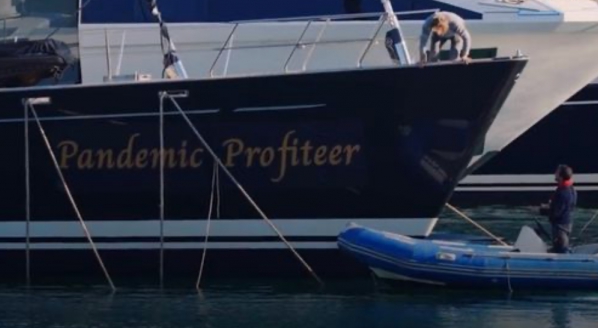
And as an addendum to that, here we are in Stroud, let's not forget that former Conservative Councillor Steve Dechan from Stroud trousered millions of PPE money. I can't remember whether his was usable but his quote was "I did very, very well out of the Pandemic" - and there are 140,000 families who would say they didn't do so well.

Taking it to the streets
Why do you think being in these public spaces is so important?
Ben Stuart: I think it's more engaging if you do something and it's on the street. I think we are awash with social content, awash with videos, memes, wisecracks and everything.
We would say that politics exists downstream of culture. We're in a narrative war to try to frame our understanding of the world and the other side are really good at it.
One thing that I hope that people realise after Trump's election is that the Right are owning the digital space and owning social media.
This is our effort to try to fight back, to try to provide progressive narratives in that space. And one thing we've found is that if you do something in a physical space it can bring incredible energy, it can become a social object. It can come alive.
So for example, you could have re-tweeted David Cameron's tweet and all the other subsequent Brexit tweets that we put up and said "look at this, they promised us the easiest trade deal in history and it hasn't happened." But going out at night and putting these things up as a sort of guerilla campaign group and then posting them back online, something really interesting happened, they sort of came alive and suddenly they became hyper-viral and we found that these quotes were being cited back to these politicians on the Today programme suddenly.
We learned that doing something in the real world when there is so much online is a really really powerful way to express a political idea.
James Sadri: I would add to that - it's not just in the real world but it's often in a space that we haven't asked permission for, so the activism element of it, brings energy to us and for the intervention generally.
A lot of these interventions, it's a grey legal area and we try to use that when the Police turn up. It's not always completely straightforward.
James Sadri: We've just bought a billboard for the next six months in Clacton - Nigel Farage's constituency - which he really is not very happy about. We've got a big counter up on this billboard which is how much money he's earning from second jobs. He's earning far and away more than any other MP.
Ben Stuart: Latest update is he's earned £210,000 in three months.
James Sadri: from his GB News appearances and all sorts of other things. So this "man-of-the-people" representing the good folk of Clacton is off, he's got priorities elsewhere.
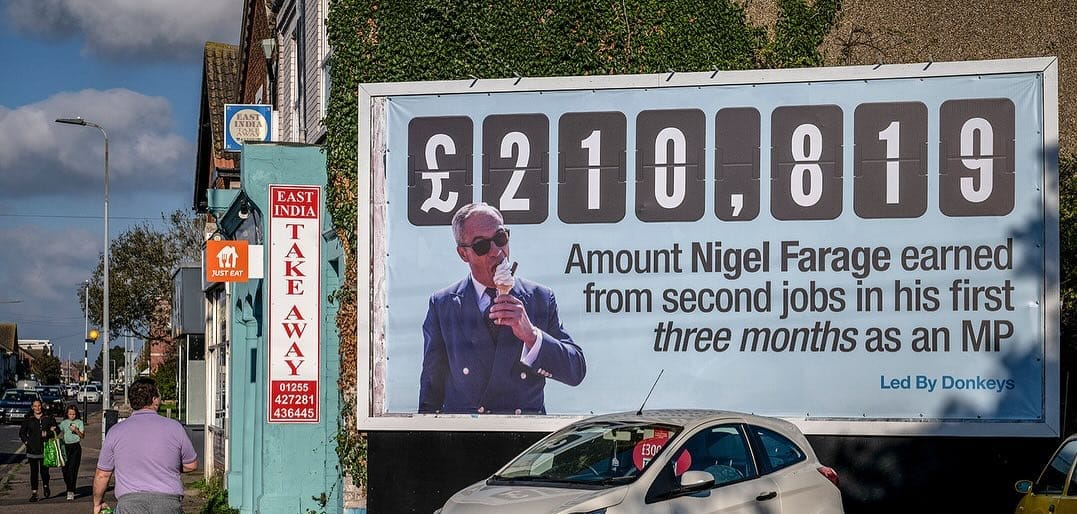
Ben Stuart: Billboards are great! I've always felt quite upset seeing billboards in public spaces - I don't want my kids seeing McDonald's adverts - no-one asked me, no-one asked my permission. We felt when we started doing billboards, we were always looking for corporate criminals to paste over - some of the banks that rinsed us in 2008, car companies that worked to deny action on Climate Change and it's great to put something progressive over that. But - I wouldn't say that billboards are necessarily our bread and butter. They are one tactic that we use.
There was a piece in the trailer [screened at the beginning of the event] of our investigative journalism with Kwasi Kwarteng and Matt Hancock.
As we were doing our action with Michelle Mone's yacht, James and I — at 5 in the morning — were sending out emails to all these MPs seeing if they would work for our fake South Korean investment company. Then we went and got on this electric boat to do the action.
We were just intrigued to see whether they would work for us and how much they would ask for, so we sent off all these emails off, went down to Barcelona, and as we got out of the marina and went to check the footage, we were getting all these ping, ping, ping messages from MPs, saying "I'd love to meet you."
The next day I remember sitting on the sofa in my dressing gown pretending to be vice president of Corporate Affairs at Hanseong Consulting, conversing with Kwasi Kwarteng and Matt Hancock. They came through for us and we found out that their rate was £10,000 a day, which was illuminating and in the public interest.
I guess what I'm saying is that there were two tactics working simultaneously there which was Direct Action and Investigative Journalism and we'll kind of do whatever works.
James Sadri: and that actually didn't have any real world manifestation at all.
Ben Stuart: It's worth saying that Donkey Number 1 always is and always will be Nigel Farage, but I think there's some donkey-like behaviour going on at the highest levels of Government. Unfortunately, globally we are led by donkeys. We did something the night before last on Elon Musk and so we went to the Tesla European HQ in Amsterdam and we projected a film there which is doing really well on social media at the moment.
That was to try to tell the story about oligarchic power in the United States. You've got the world's richest man, bought the Town Square, corrupted it and has spent 200 million dollars getting Trump elected, when he's currently under 20 investigations by the Federal Authorities — that Trump is now going to be in charge of. That is "top tier" donkey-like behaviour.
At the same time, there are elements of the Labour government that we are really disappointed about and that will manifest itself soon, I hope.
James Sadri: That vinyl canvas we dropped in front of Labour HQ to remind Keir Starmer of what he said about Proportional Representation before he came into power.
I think it's also worth underlining that we don't have a manifesto — we're four people with different views on different issues.
There is no kind of "Led by Donkeys position" on anything. Speaking personally, the horrors that are going on in Gaza and that the government is still exporting weapons to the Israeli government. I don't know how they can not be donkeys when they are doing that frankly.
James Sadri: Our world is ruled by algorithms these days and it's deeply concerning. We have this slightly strange relationship in that we use the algorithm to distribute our content but we don't get involved in social media conversation generally because it's pretty toxic. What can we do about it? I think collectively we're all going to be learning how to put some guardrails on what's going on but What Musk is doing to Twitter is pretty out of control.
Ben Stuart: Just going back to what you said earlier about the American Election. I don't think we appreciate the extent to which the Right owns the digital space. The top three podcasts are Joe Rogan and other hard right actors. Every day, the biggest videos on Facebook are right wing political videos.
There was one space where progressive ideas could really fluorish and that movements could be born - and that was called Twitter. So they just bought it, pressed a button and changed the algorithm. In our film we detail this crazy story about when in 2023, Musk tweeted his support for the Philadelphia Eagles in the SuperBowl and Joe Biden tweeted at the same time.
Joe Biden's tweet was viewed 29 million times and Musk's was viewed only 9 million times. Musk was so incensed he called a meeting that evening, at 2:36am and demanded that the algorithm be changed so that his tweets would be boosted 1,000-fold. That's why if you go on twitter/X it's "Elon Musk, Elon Musk, Elon Musk".
Imagine trying to explain that into the future 5 years ago that the world's richest man would do that. We're like boiled frogs, we just kind of going "what can you do?" - it's a crisis of disinformation… and information.
Joe Magee: Is he more powerful than Donald Trump?
He's more powerful than J.D. Vance - I mean, look at who the real Vice President is. We'll see won't we? Ultimately Donald Trump has the power but Elon Musk is in an incredibly powerful position at the moment - to define culture. His wealth went up 22 Billion quid the day after the election. That was the size of the hole that Rachel Reeves found in the British economy and that we've had to have all these cutbacks and tax increases for. Elon Musk made that in a day.
Joe Magee: Is most of what we're seeing online right wing?
No, I think it can be in our progressive bubble to not realise the extent to which the conversation is dominated by right wing ideas and narratives. People in America aren't getting their ideas from traditional news and media anymore - Joe Rogan's interview with Trump is now up to 50 million views on YouTube - so they are doing really well in that space, so progressive actors need to build their own institutions, their own successful podcasts, their own news sites - and that's what we're trying to do in our own small way, is ensure that that space isn't handed over to the right. We try to do imaginative and creative things that go hyperviral to introduce progressive ideas.
The Elon Musk video is 9 minutes long - it's deeply researched, we're also trying to arm people with the ideas and the facts to win arguments. Rather than just saying "Elon Musk, he's a bad man" we've actually laid out everything to support this information in a way that can be useful to people.
James Sadri: Some of our interventions reach well outside of any sort of progressive bubble, into places like the Daily Express and the Daily Mail, so I suppose we are reaching a lot of people outside of preaching to the choir.
Sometimes people think that your content is just about convincing people: shifting them from 'Position A' to 'Position B'. A lot of what we do is different to that because we actually started making and creating these interventions for ourselves, for our sense of catharsis, to feel that how we felt about the world was being seen out there and reflecting what we could see in these physical billboards and other interventions.
We get that feedback a lot, that people find our work is important to them because it feels like this thing that they've been feeling about the world isn't necessarily being expressed or articulated in the various communications that they are receiving. And for me that is the most important thing: to be able to give something to someone that says "this is how I feel about this issue" and I can pass that on and that can help root a conversation I want to have about Michelle Mone, or Gaza, or the Pandemic. That's more important than actually something that's just trying to convince someone of a particular point.
I think morale is a really really undervalued element too - on the progressive side, if you want to call it that, it can feel like a brutal assault when you watch the news sometimes, and having bits of content, sometimes humorous that can lift your morale a bit and make you feel a bit better about the grimness that's out there.
That counts for something.
Ben Stuart: There are examples we can look back on. When we did the Covid Memorial Wall we worked with Covid-19 Bereaved Families for Justice and their objective was to get a rapid review Covid enquiry. So we worked with them and we were thinking, how can we do that, how can we elevate their message.

We came up with this idea of the Wall - and the Wall was really really hard work to install - it took 1,000 people in the end. On the first morning when we set it up we were thinking we're never going to get this done - it's half a kilometre long and we had to hand paint the hearts.
But it became a kind of famous place - Starmer came down and Justin Welby camed down, Johnson was under incredible pressure to come down. Using the Wall, the families got this platform to demand this rapid review.
Johnson eventually came down under cover of darkness because he didn't want to meet the families. He was being asked why he hadn't gone down to the Wall and the next day announced the enquiry in Parliament.
At the enquiry when he was giving evidence, above his head was this huge picture of the Covid Memorial Wall. I think that working we these families, we played a part — not a huge part — but a part in getting some degree of justice for those families.
Ben Stuart: You mean, if we take complex policy ideas and boil them down to a banner or a snarky 15 second video, how are we going to have a grown-up conversation about the policy in the first place?
I would say that whether we like it or not, these are the waters in which we swim. You cannot win a narrative argument in society by producing a peer-reviewed paper.
You have to find a way to take these ideas and boil them down into easily-shareable and easily-digestible concepts. That's what we try to do.
We didn't invent what the Digital Town Square looks like now, we're working within it. There isn't the space anymore to do a seven minute interview on Newsnight or BBC News.
James Sadri: We have a deep, deep commitment to the truth. We fact-check and double-source everything that we can. We are trying to get that truth out there in a way that Farage is trying to do the complete opposite - with Trump - they sow deep misinformation and establish a lot of untruths as reality.
These are diametrically opposed aims but where there is overlap is in this idea that memes and thinking about communicating ideas in ways that people are motivated to share.
Finding creative ways to land what are important pieces of truth is what our project is about.
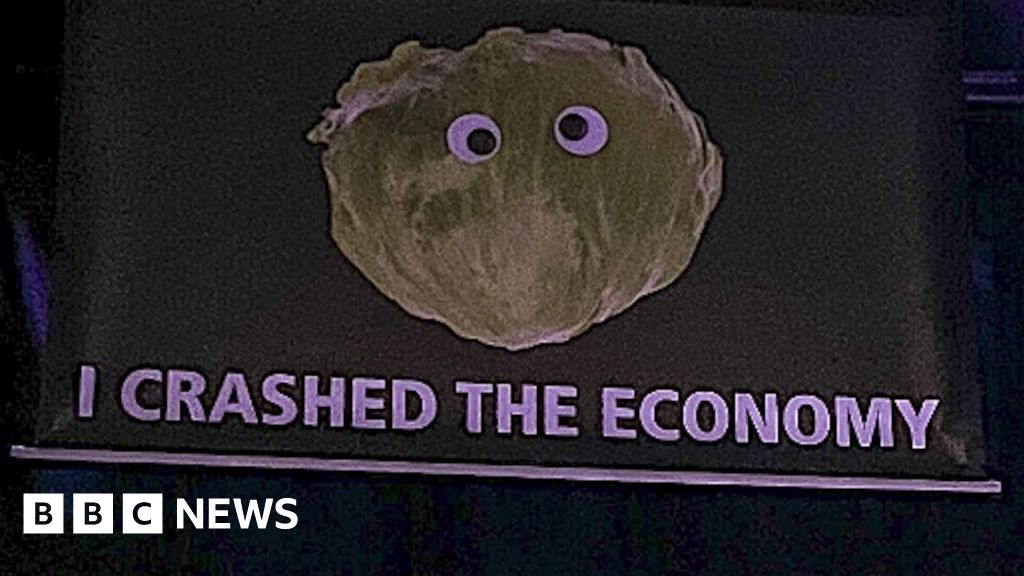
Ben Stuart: Let's talk about Liz Truss. I was the one that was going to press the remote control button to bring it down. And we were determined that we would press it when she started talking about how she supported Trump.
I had this idea in my head that I was only going to press the button right at the end because I was deeply worried that they were going to cancel the event as soon as I pressed.
James Sadri: For a point of clarification - Ben was the only member of the team who cared for the people who had paid money to go and see Liz Truss at the event!
Ben Stuart: They had paid £16.50 to see Liz Truss!
I decided to wait until the end and I was going to press it and hand the remote control to the steward who I saw six or seven seats down from me, who was directing people. I would explain to him that nothing more was going to happen.
I pressed the button, it came down. She was wearing this green dress which was the shade of a lettuce. It came down and she stormed off - she was absolutely furious. There was pandemonium and I went over to the steward.
I said “mate, mate can I have a word. There's the remote control. Listen, it was me that did it, you're not going to get any more trouble from us. Just don't cancel the event.”
He looked at me, put his hand on my shoulder and said: “I'm Liz Truss' Chief Protection Officer, you are under arrest from the Metropolitan Police.”
I spent the night in Great Yarmouth police station.
Ben Stuart: For me at least it was seeing that Non-Violent Direct Action (NVDA) could really shift power around an issue. One of the first actions I ever did was when we discovered that New Labour had re-fitted the Cabinet Office building with illegal Cameroonian sapele wood doors. We broke in, replaced them with sustainable wood and took the sapele doors up on to the roof for an occupation.
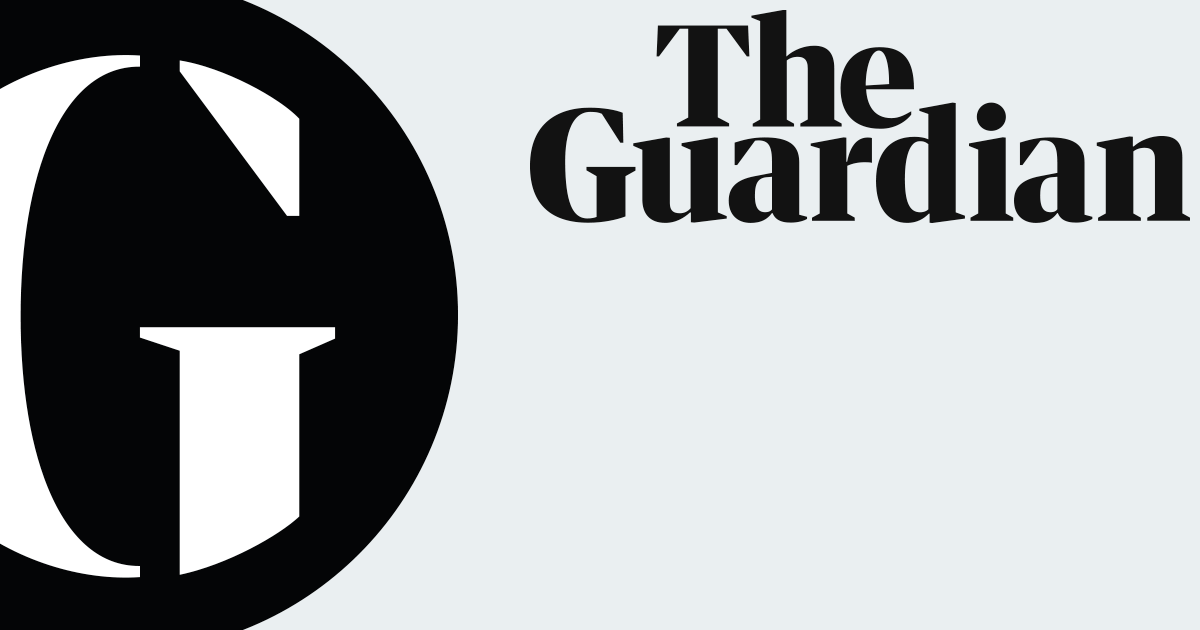
While we we up there Blair announced a review of government procurement policy in the Commons.
So direct action had got a win.
After that I was up for whatever I thought would work.
Hope is a Dragon
Ben Stuart: I would say the first thing is a realisation has to be that we're losing out there in the battle for ideas and narratives.
I think that what happened on Tuesday [Election of Donald Trump as President of the United States] should be a really really big wakeup call.
There is an assumption that because New York Times op-ed pages are saying a certain thing that's where the locus of the national conversation or the international conversation is. It's not - we're getting hammered in digital spaces.
I'm going to say something slightly pretentious which is that I think people who have progressive ideas are generally more creative and are better at communicating.
I hope that this realisation that we're losing that is going to be a real wake-up call.
We have to make our own podcasts, we have to make our own institutions, we have to make our own think-tanks, everything needs to be re-thought because we are getting hammered.
Yes, I am hopeful. I was speaking to my partner earlier and she was saying that she'd seen a quote:
We think that hope is this gentle butterfly flapping its wings, it's a dove with an olive branch in it's beak or something, but it's not, it's got to be a roaring dragon, it's got to be so, so determined and loud and angry and uncompromising.
That's what we need to do. We need to go out there and tell our story in a way that becomes irresistable, otherwise this is going to keep on happening.
With thanks to Caroline Sanderson and all at Stroud Book Festival. For a £10 fee, you can watch the full recording of this interview as well as several other brilliant Book Festival sessions
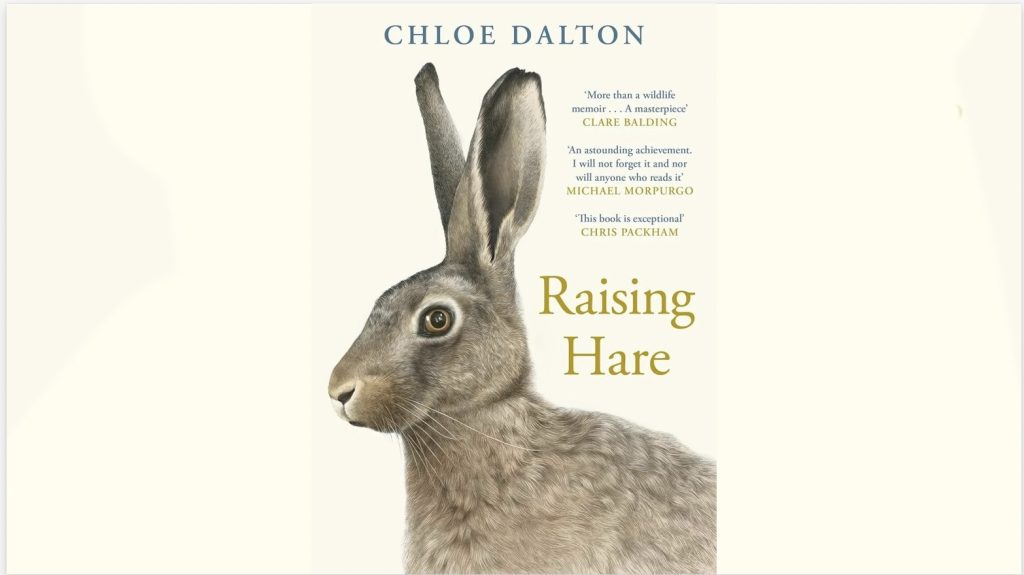
The Book
Adventures in Art, Activism, and Accountability
Book Review by Robin Layfield
The Led By Donkeys book is a complete and comprehensive document of so many of the actions that Led By Donkeys have taken since they first formed over that viral David Cameron tweet.
It shows in vivid detail the full breadth of their work and serves as inspirational call for direct action from all of us. Turning the pages I was reminded again and again of the brilliant images and videos that were able to race around the world before their subjects had got out of bed.
Farage, Cameron, Johnson, Truss skewered by their own words and actions. Awareness raising on the NHS, on PPE mis-spend, on immigration policy, on Gaza, on Ukraine, on politicians eager to enrich themselves in exchange for their integrity and on democracy itself, every campaign landing a powerful blow for truth.
From the introduction:
We're trying, in our own small way, to hold powerful people responsible for what they have said and done, to chip away at the impunity so many of them enjoy in an age of hyper-partisan media.
Politicians and influential commentators, not least those on the populist right, can nowadays pursue wildly successful careers by preaching nonsense, lies and half-truths to the supporters with whom they share a bubble. It's our job to prick it.
Does any of this make a difference? We hope so. There is a battle underway to shape the myths this country tells itself about itself, and this is our contribution to that story war. The preaching of British exceptionalism by Johnson, Farage and their fellow travellers has been a curse that has doomed us, paradoxically, to decline.
The enemy was never asylum seekers, Brussels bureaucrats or foreign courts. It was and is corruption, incompetence, sophistry and nationalism here at home.
Reading through the book, I am struck by how long Led By Donkeys have been active for, by how much I remember each of their campaigns, from them ploughing messages into farmers' fields, projecting "our star" onto the white cliffs of Dover and the Line of Duty style interrogations of Boris Johnson over Covid. Memorable scenes of the road outside the Russian Embassy being painted half yellow, half blue.
Led By Donkeys are situationists, anarchic, comedic, always truthful; they have a talent for capturing the public imagination and saying the things that need to be said in a media landscape populated by client journalism, hate-fuelled rhetoric and the appeasement of power.
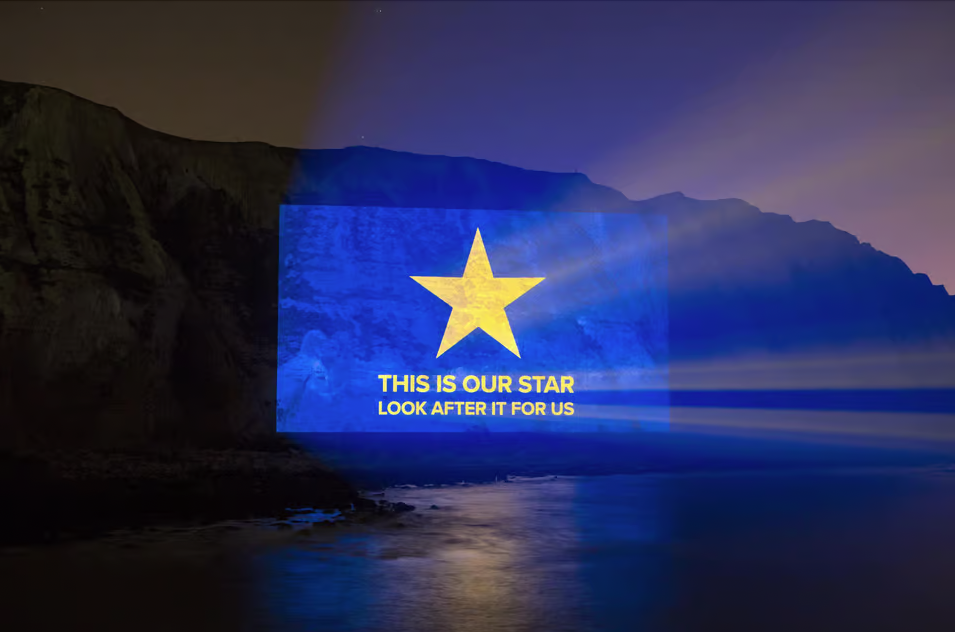
What sets Led By Donkeys apart is that their messaging resonates, it strikes a chord with everyone, because their messages are so straightforward, visual and direct and because they land.
That they are unafraid to talk about what they do so openly, are eager and willing to partner with and support other campaigns and organisations is something for them to be proud of and this book is a fitting testament to that.
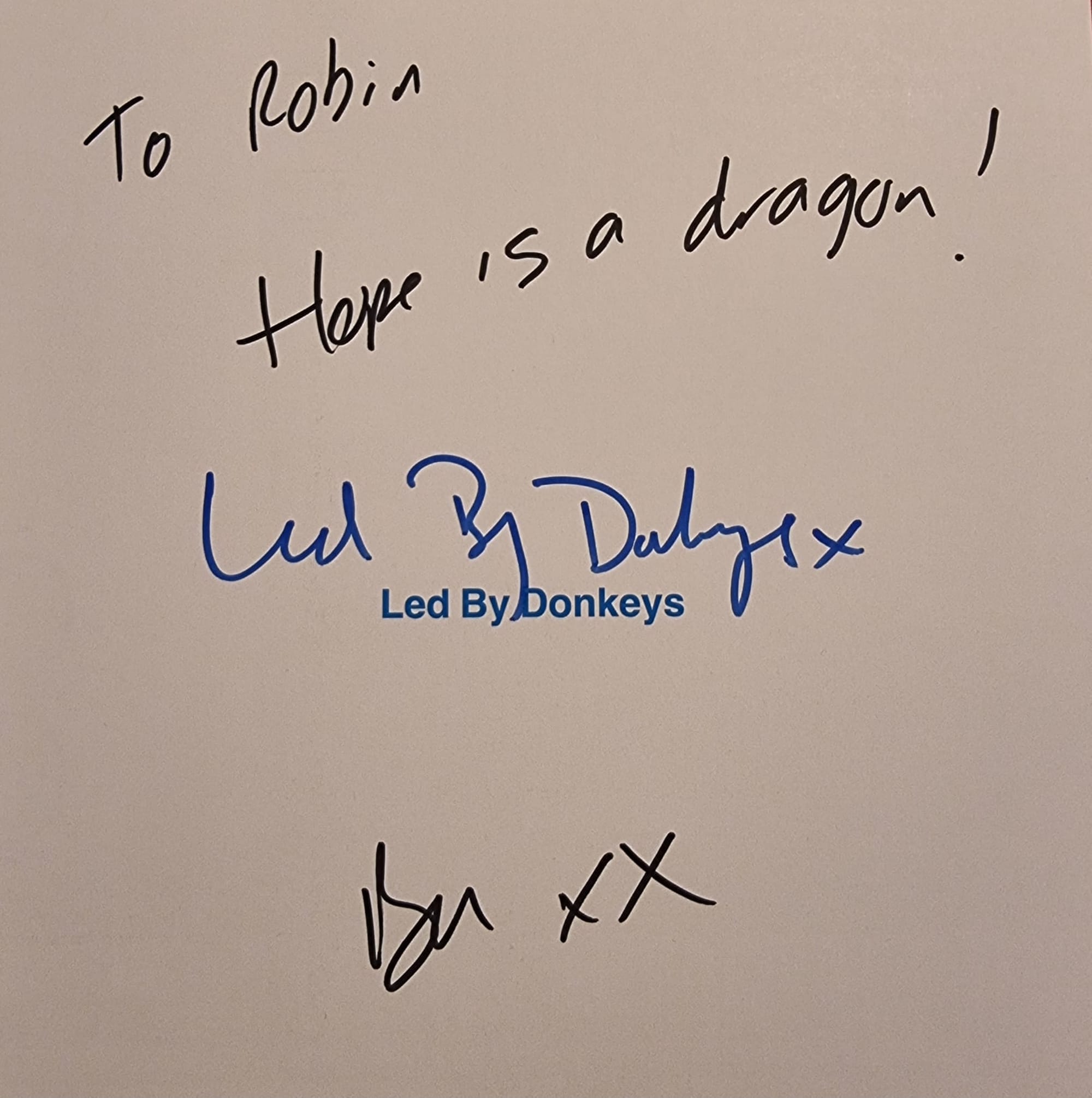
You can buy this book online - or order from an independent bookshop like Yellow Lighted Bookshop in Nailsworth & Tetbury, or Stroud Bookshop.
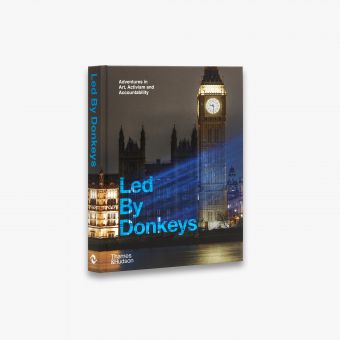

Amplify Stroud is supported by Dialect rural writers collective. Dialect offers mentorship, encouragement and self-study courses as well as publishing.
You can find out more at https://www.dialect.org.uk/

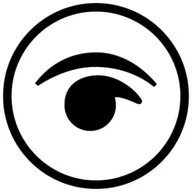









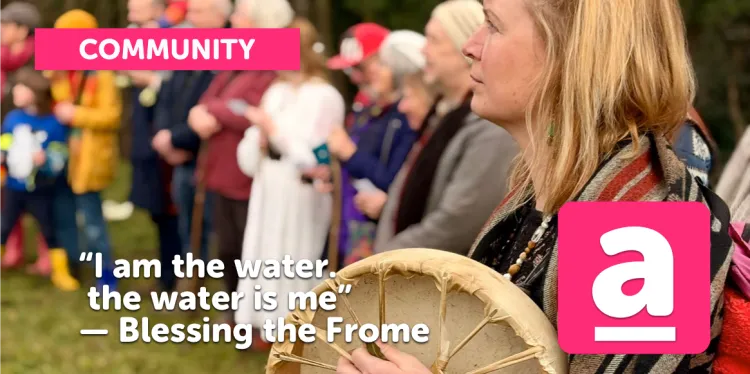
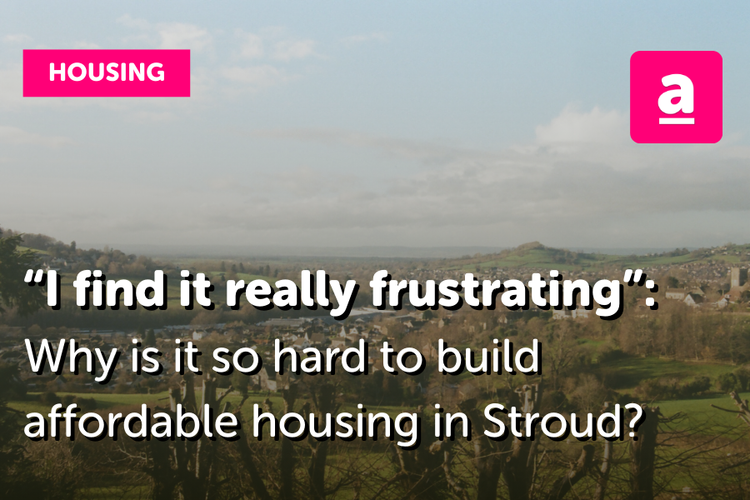
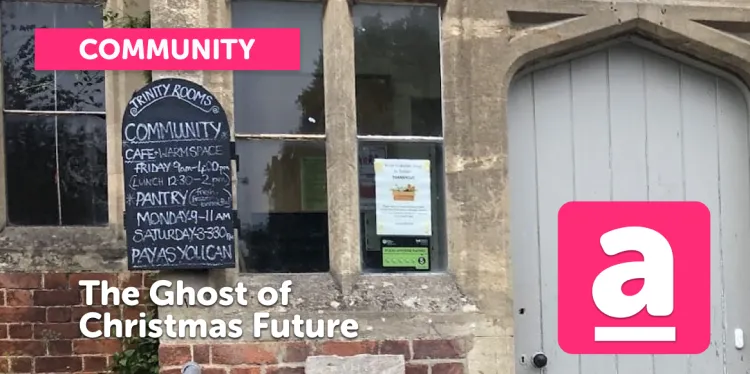
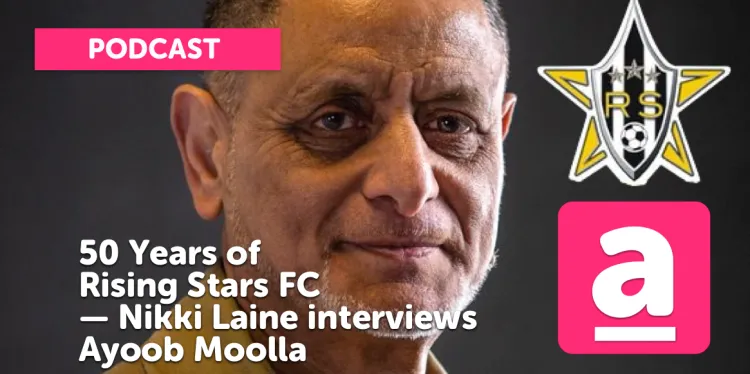
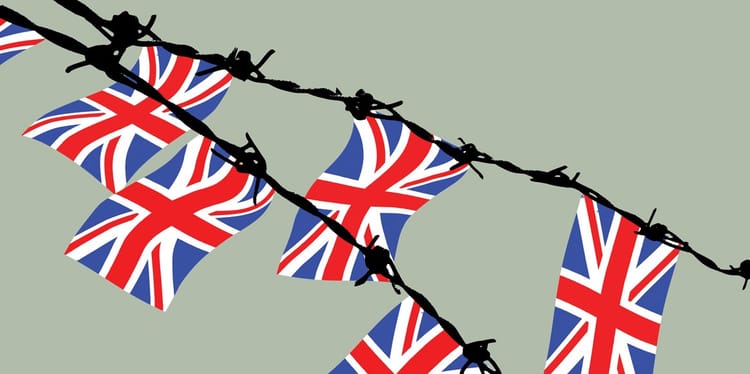
Member discussion